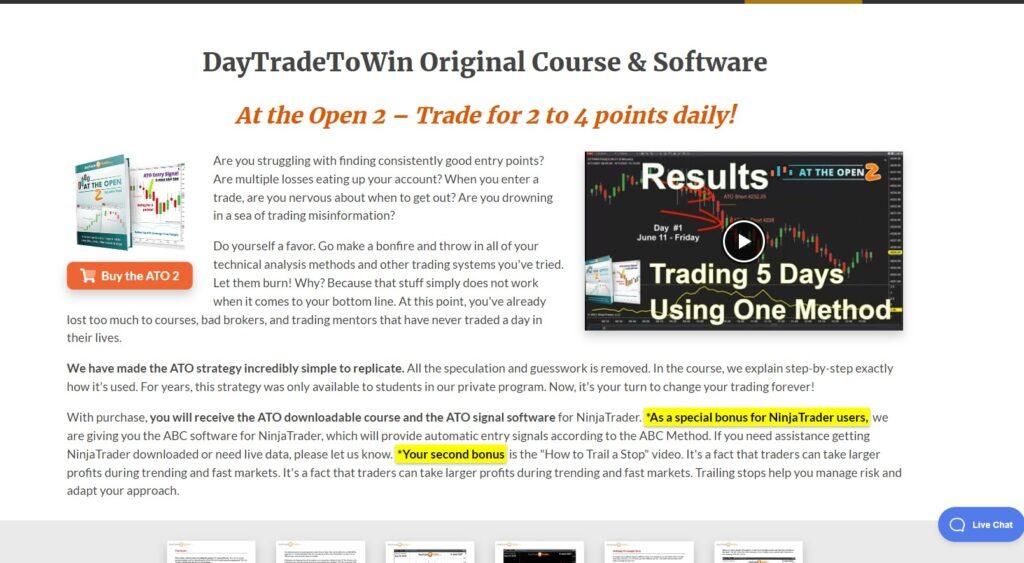The Ultimate Guide to Day Trading For Beginners
How Does Day Trading Work?
Day trading is a form of trading in which someone buys and sells a stock, commodity, currency, etc., within the same day. A day trade is considered successful when a trader makes a profit from the buying and selling of stocks during the same day. Day traders need to be constantly aware and up-to-date with the stock market to make profitable trades. They need to have a solid trading strategy and be able to quickly execute positions within the same trading day. Successful traders can also think of day trading as an activity that can produce profits over time instead of focusing on individual trades. Swing trading is another popular strategy used by day traders, as it involves holding positions for longer than one day, but not necessarily overnight. Day traders usually close out their positions before the end of each trading day so they don’t get affected by sudden movements in the markets overnight. Day trading works best for people who have some knowledge about the stock market and understand how it works, as well as having some experience in making successful trades.
Is Day Trading Good for Beginners?
Day trading can be a great way for beginners to get started in the stock or futures market. A beginners guide to day trading is available at daytradetowin with the get started trading PDF. Traders need to learn how to correctly buy and sell stocks quickly in order to take advantage of short-term price movements. When starting out, you may find it difficult to become successful as a day trader, however, as it takes time and discipline to learn the strategies associated with it. Beginners should take their time learning about the markets before jumping in and risking losing money. As with any form of investing, there are risks involved with day trading; however, if done properly, it can be a great way to learn more about the market and potentially make money. Day traders must have an understanding of financial markets and possess knowledge about when to buy and sell stocks. Becoming a successful day trader takes practice, patience, and dedication.

How Much Do You Need To Start Trading?
A little goes a long way, especially when leveraged on margin. Day trading is a type of investment strategy in which one attempts to make profits from small price movements in stocks or other financial markets. To be successful at day trading, you need more than just knowledge and experience – it’s important to understand the financial markets, analyze stock trends, and have the right tools. The amount of money you need for day trading depends on your risk tolerance and the size of your account. Generally speaking, you will need at least $500 to $2,000 to open a brokerage account and start day trading. Having enough capital to cover potential losses is essential as day traders often use leverage or margin to increase their exposure. You may also want to consider additional costs such as commissions and fees charged by your broker, when calculating how much money you need for day trading.
Can You Day Trade with 1000 Dollars?
Day trading with $1000 is possible, but it can be a risky and challenging endeavor. A day trade is when a trader buys and sells the same stock within one market day. If you trade the futures Micro E-mini (MES), trading with a smaller account is possible. The pattern day trader rule requires any trader who executes four or more day trades in five business days to maintain an account balance of at least $25,000. If you only plan to make three-day trades per week, then you could potentially start with $1000. However, it is recommended that even if you are able to meet the pattern day trader requirements for starting with $1000 that you start with more money to allow for losses due to unpredictable market conditions. As a day trader, you may experience large swings in your capital, so it’s important to make sure you have enough funds available in your account to withstand these fluctuations.

Can Anyone Learn Day Trading?
It is possible for anyone to learn day trading, although it requires dedication and hard work. A day trader is someone who buys and sells stocks, currencies, or other financial instruments within the same trading day. This type of trading involves careful analysis of market trends and news events in order to identify potentially profitable opportunities. Learning how to day trade can be a great way to make money, but it’s important to understand that there are risks involved. In order to become a successful day trader, one must develop their own trading strategy, set realistic goals, and practice risk management techniques. Day traders should always use stop-loss orders to limit their losses if the market moves against them. Additionally, they should also look into getting professional advice from experienced traders before entering the market with large sums of money. With time and dedication, anyone can learn how to day trade successfully.
How Much Can You Make As a Day Trader?
As a day trader, your potential earning power is largely determined by the trading strategy you choose and how effectively you execute it. With careful research, savvy investors can make remarkable profits from day trading. When starting out as a day trader, it is important to remember that no amount of money can guarantee success in trading. Successful traders are able to consistently utilize their chosen strategies to generate profits while managing risk exposure to ensure they don’t lose too much on any one trade. Depending upon the market and methods used, some day traders have reported making hundreds or even thousands of dollars per day in profits. Ultimately, the amount you can make as a day trader depends on many factors, including your knowledge of the markets and your own capital investments.
Is Day Trading Like Gambling?
Day trading can be compared to gambling in some ways. It involves taking risks with your money and often involves losing money. However, day traders take calculated risks based on market analysis, so it’s not exactly the same as gambling. When you think of day trading, you might picture a person monitoring stock prices all day and making rapid trades to make a profit; however, day traders actually spend most of their time researching which stocks have the potential for growth and understanding the market trends before making any decisions. Day traders are also more likely to use strategies that allow them to limit their losses if something goes wrong. While there is always a chance of losing money when day trading, it is more of an investment than gambling.
What are the risks of day trading?
Ultimately, day trading comes down to buying and selling within the same day hoping to be right in the direction and price. It can be a profitable way to make money, but it also carries high financial risks. Day traders must have enough capital to withstand any losses that may occur, as well as the ability to accept large amounts of risk. Oftentimes, quick decisions are necessary and inexperienced traders may not be able to handle the pressure. Day trades can also incur high costs due to transaction fees and other charges. There is also the potential of experiencing significant losses if market conditions change quickly or if a company’s stock suddenly drops in value. A trader must carefully understand the risks associated with day trading before investing any money into such ventures.
[embedyt] https://www.youtube.com/watch?v=I61QFS9pAFg[/embedyt]Day Trading for a Living … Is It Possible?
Day trading for a living is definitely possible. To start day trading, you need to have an understanding of the stock market and an ability to make quick decisions based on the changing market conditions. You will also need to have the right tools, including access to the right data, software, and brokers. Day trading is not for everyone as it requires a lot of dedication and hard work. It can be risky, but with proper research and education, you can develop your skills to become successful in this field. Before you start day trading, it’s important that you understand all of the risks associated with it so that you can make informed decisions about your investments.
Is day trading right for you?
Day trading can be a great way to make money, but it’s important to remember that it’s not right for everyone. Day trading involves buying and selling stocks in the same day, which can be very risky because of the rapid changes in price. You need to be able to make decisions quickly, have nerves of steel, and an understanding of the markets and how they work. It also requires a significant amount of capital so you need to make sure you have enough money before getting started. If you’re confident about your ability to manage risk and are comfortable with stock market investments, then day trading may be a good option for you. However, if you lack experience or knowledge, then it is likely best that you do not try day trading and look into other investment options.
How Much Does the Average Day Trader Make?
Day trading is one of the most popular ways to make money in the stock market. Day traders are considered to be high-risk investors, as they try to capitalize on short-term stock fluctuations. The amount of money a day trader can make depends on their trading account size, risk tolerance, and their knowledge of day trading strategies. Beginner day traders typically start out with a small trading account and must learn the necessary tools and techniques before they can become successful. With dedication, practice and some luck, it’s possible for experienced day traders to make considerable profits by buying and selling stocks within a single day. To get started with day trading stocks, it’s important for beginners to learn how to use free day trading strategies effectively. By taking the time to learn about different strategies and gain more experience in the stock market, traders can increase their chances of making sustainable profits from their trades. Ultimately, how much money a day trader makes depends on their success in implementing an effective trading strategy over time.

Basic Day Trading Techniques
Day trading is a popular trading style used by many investors and day traders. Basic day trading techniques involve buying and selling stocks, indices, currencies, or other financial instruments within the same day using trading apps, or charting software. Day traders can use these techniques to take advantage of short-term fluctuations in the market to make profits. A day trader will typically look for quick opportunities to buy and sell securities, aiming to capitalize on small price movements. By employing basic day trading techniques such as technical analysis, charting patterns, and fundamental analysis, day traders can often outperform traditional buy-and-hold investors. Additionally, some basic strategies like scalping and momentum trading can be utilized by experienced day traders. As with any investment strategy, it is important to understand the risks associated with each approach before beginning a new trading style.
Day Trading with Cash vs. Margin
The process of dating using margin is very popular. Most futures traders use margin to trade the micro E-mini SP (MES), or E-mini S&P. Using margin vs cash Day traders trade stocks, futures, options, currencies, commodities and other instruments. Day trading with a cash account requires the day trader to have enough capital to cover all his trades on the same day. Trading with a cash account also limits the amount of leverage that can be used by day traders. On the other hand, day traders who trade on margin use borrowed funds from their broker or bank to finance their trades. This allows them to take larger positions than would otherwise be possible in a cash account. Day traders who use margin must meet certain requirements set by their broker or bank in order to qualify for this type of trading. Day trading with cash vs margin has its own advantages and disadvantages; however it is ultimately up to the individual trader as to which method he or she chooses.
How to Start Day Trading
Start with a trading course or trading mentor. Trade secrets can sometimes be a process of day trading. Buying and selling securities may seem easy, but without proper instruction, you can get in trouble quickly. Successful day trading aims to capitalize on short-term market price fluctuations, which can be driven by news, economic releases or other events. To start day trading, you need to decide what instruments you want to trade, such as stocks, options or futures. You also need to choose the right brokerage for your needs and set up an account with them. Once you have chosen the instrument you want to trade and opened an account, you can then begin learning about how to become a successful day trader. This will involve researching the markets and looking at technical analysis tools such as charts and indicators in order to make informed decisions. To be considered a day trader, certain rules need to be followed by brokers and securities. It’s important that you use sound money management techniques to limit losses while maximizing profits when day trading. Ultimately, with practice, patience and discipline, it’s possible for anyone to become a successful day trader.

All Day Trading Strategies Require Risk Management
Day trading for dummies is underrated unless you understand the risk involved. Day trading strategies require traders to have a good understanding of the markets and the ability to manage risk effectively. To be successful in day trading, it is essential for any trader to choose a suitable trading strategy and master it. Beginners should start out with simple strategies such as trend following or support and resistance before moving on to more complex strategies such as scalping or swing trading. Regardless of the chosen day trading strategy, all-day traders must ensure they practice effective risk management techniques to protect their capital from potential losses. This includes setting stop-losses, using appropriate leverage levels, diversifying one’s portfolio and limiting the amount of money invested in each trade. By implementing these risk management principles, beginner traders can help reduce their losses over time and eventually become profitable day traders.
How Much do Day Traders Make
Day traders make money by buying and selling stocks and futures within a single trading day. They use complex strategies to capitalize on short-term stock market movements and take advantage of fluctuations in price. Day traders can trade on margin, which allows them to borrow money from a broker to increase their potential profits. However, this also increases the risk of losses if the stock falls in value. The amount of money that day traders make varies significantly depending on the amount of capital invested, the strategy used, and the success rate achieved. On average, experienced day traders have been known to make anywhere from a few hundred dollars per day to thousands per day, depending on the size of their trades.
Day Trading Requirements
Day trading is a popular form of trading for people looking to make short-term profits in the stock market. To be able to day trade, an individual must first open a day trading account with an online broker. This type of account has different requirements than a traditional trading account, such as having a minimum balance and access to margin accounts. A pattern day trader is defined as someone who executes four or more trades in five business days with the same stock or options symbol. Pattern day traders must maintain at least $25,000 in their day trading accounts at all times and are not allowed to use borrowed funds to execute trades. As such, it is important that potential day traders understand the risks involved and have sufficient capital before attempting to enter the world of day trading.
Day Trading Basics for Beginners
Beginners in day trading must learn the basics for a successful start. To get started day trading, a beginner should first learn how a stock trades in order to buy and sell successfully. Stock indices, futures, or currencies should understand different trading strategies and chart patterns, as well as develop their own trading strategy. Additionally, they should know the rules of Pattern Day Trading (PDT), which requires traders to have a minimum account balance of $25,000 when they begin trading live trading with real money. Before taking the plunge into day trading with real money, it is important to practice in a demo account or a paper trade account to gain experience without risking your own capital. By mastering the basics of day trading, beginners can increase their chances of success and become more confident in their trades.

What You Need To Start Day Trading
If you want to become a day trader, you need to start by understanding what day trading is all about. Day trading, or intraday trading, involves buying and selling financial instruments like stocks within the same day. As a beginner, it’s important to research different trading platforms and determine which one best suits your needs and trading style. You also need to select a popular day trading stock and create a well-thought-out trading strategy that will help you maximize your profits. Lastly, you’ll need to open up a trading account with the platform of your choice to start day trading. Once you’ve done all of this, you can begin actively engaging in the activity of day trade and take charge of your own financial future.
Strategies for Day Trading
Before trading live, consider practicing and learning different methods to expand your knowledge. Education is the most important trading tool missing from your toolkit. DayTradeToWin.com offers a few basic beginners courses like the At the Open and Trade Scalper. But for those who know what they’re doing, it can be very rewarding. There are many strategies that day traders use in order to achieve success in the markets. These vary depending on the individual trader’s risk appetite, trading style, and stock selection. One important factor to consider is trading volume, which indicates how much interest there is in a particular stock or asset. A successful day trader will buy when there is a high volume and sell when it decreases. Many day traders employ various strategies, such as scalping or momentum-based trades, each requiring different levels of risk management and skill level. In order to become a successful day trader, one needs to develop their own trading style that combines the right amount of risk management with proper analysis techniques for selecting stocks or other financial instruments that meet their criteria. With patience, discipline, and practice, anyone can become a successful day trader.
Which Trading Strategy Is Easiest for a Beginner?
To make day trading work for a beginner, the easiest trading strategy is to buy and hold stocks. Day trading tips for beginners can be as simple as using price action to understand the price movement. This strategy involves buying shares of stock in a company and holding onto them for an extended period of time. This allows the beginner to benefit from the long-term growth of the stock without having to make frequent trades. It also doesn’t require any complex analysis or financial knowledge. The main risk with this strategy is that it can take some time for your investment to grow in value, so patience is essential. Additionally, market conditions could cause the stock price to fall, resulting in a loss if you sell at the wrong time. Nevertheless, this strategy is often recommended for beginners because it’s simple and straightforward.
[embedyt] https://www.youtube.com/watch?v=pm8b5lHUtyo[/embedyt]What Is The Best Day Trading Strategy?
Day traders often use trading tools such as charts, technical indicators, and options trading to analyze the stock market’s movements during trading hours. To be successful, day traders need to follow a set of rules and regulations that they have established for themselves. Day trading strategies vary depending on the trader’s risk appetite and investment objectives. Generally, day trading strategies require active monitoring of price movements throughout the entire trading day with an emphasis on short-term profits rather than long-term gains. Day traders often look for opportunities to buy low and sell high while also managing any risks associated with their trades. A variety of day trading strategies exist, from simple trend following to more complex arbitrage strategies. Ultimately, the best day trading strategy depends on each individual trader’s specific goals and preferences.
What Is the Best Day Trading Tool?
The best day trading tool for a day trader is by far, the trading simulator. Before trading live, practice what you have learned, especially the day trading rules. This all-important tool provides individuals the chance to practice and learn. Day traders need to consider the different types of trading tools available, such as charting software, stock scanners, and financial news feeds. A good day trading tool should provide features that meet the trader’s needs and help them make informed decisions when it comes to buying and selling stocks. For example, charting software can be used to analyze historical data, while stock scanners can indicate potential entry and exit points. Additionally, financial news feeds can provide up-to-date information about stocks which could impact the prices of certain stocks. Ultimately, the best day trading tool is the one that meets the individual needs of each day trader and helps them stay informed on what’s happening in the stock market.
Is Technical Analysis or Fundamental Analysis More Appropriate for Day Trading?
When it comes to day trading, the debate between technical analysis and fundamental analysis is a hotly contested one. Technical analysis focuses on identifying and leveraging short-term trading patterns, while fundamental analysis focuses on understanding the financial health of a company. Ultimately, the decision of which type of analysis to use will depend on the individual day trader.
For those who want to make quick decisions based on immediate information, technical analyses are often the most appropriate choice. Day traders tend to understand those small movements in price can mean large profits over short periods of time, and so they look for opportunities in these markets by analyzing trading patterns. Fundamental analysis can also be useful when looking at longer-term investments; however, since most day traders are focused on short-term gains, technical analysis tends to be more appropriate.
Why Is It Difficult to Make Money Consistently From Day Trading?
Trading and investing are difficult for most novices, especially when trying to make money consistently. Throw in volatility, and now it becomes chaos. A beginner will find it incredibly hard to manage their funds and stay profitable over the long term. Day trading involves a lot of technical analysis, which requires knowledge and experience and knowledge of how financial markets work. Additionally, there are numerous economic indicators that need to be monitored in order to make successful trades. This means that day traders must dedicate a considerable amount of time and effort to studying market conditions to make good decisions on when to enter and exit trades. It is also important for them to understand risk management techniques, as well as psychological aspects such as emotional control and discipline that are necessary for success in day trading. All these factors make it difficult for beginners to make money consistently from day trading.
Should a Day Trading Position Be Held Overnight?
The guide to day trading tells us that we enter and exit during a trading session. Day traders are typically looking to enter and exit a position within the same day, and as such, the question of whether or not a day trading position should be held overnight is an important one. Ultimately, the answer to this question varies depending on the individual’s risk tolerance, market conditions, and trading goals. Some day traders may opt to hold a position overnight if they are confident that the asset will continue to appreciate in value, while others may prefer to take profits earlier in order to avoid potential losses due to overnight events or changing market conditions. Ultimately, it is up to each individual trader to decide how long they would like to hold their positions.
How much does the average day trader make?
The average day trader makes a modest income from their investments, depending on the amount of capital they have and the type of trades they make. Generally speaking, the more money you have to invest, the higher your earning potential will be. Day traders can make anywhere between $50-$500 a day, but it may take some time to build up enough capital to start making larger profits. It’s important to note that day trading is a risky business, and losses may occur due to market volatility or poor decision-making, so it’s best to get familiar with trading techniques before getting started. Having a good understanding of financial markets and staying up-to-date on news and trends can help improve your chances of success as a day trader.
What percentage of day traders are successful?
The success rate of day traders can vary greatly, depending on the trading strategies used and the amount of research done. Studies have shown that only about 10-15% of day traders are successful in the long run. While some have found success with short-term trading strategies, most will eventually lose money due to their lack of knowledge or experience. Day traders must be well-versed in technical analysis and market behavior in order to be successful. They must also be willing to take risks and set limits on how much they are willing to lose. As a result, it takes a lot of dedication and hard work for a day trader to become profitable.

Day trading for Beginners Course
Day trading for beginners courses is a great way to learn how to get started with day trading. They provide an introduction, a day trading guide used to cover the basics, such as how to identify potential trades, how to read stock charts, and how to set up a trading account. A good course will also go into detail on risk management principles and teach money management techniques. Beginners can also learn about different types of strategies such as scalping, swing trading, and trend following. The course should also cover topics such as market psychology and the emotions of fear and greed that can affect trading decisions. After completing a course, beginners should have enough knowledge and confidence to start day trading successfully.
Final Day Trading Tips
If you’re a beginner looking to start day trading, there are some important tips you should keep in mind. The first tip is to develop a trading strategy; having a plan and following it will help you stay focused on your goals. You should also familiarize yourself with the different types of trades and the markets they involve, which will help you make more informed decisions. Additionally, always remember to manage your risk properly and never invest more than you can afford to lose; day trading is a business, so treat it as such. Finally, it’s always beneficial to join an online community or find an experienced day trader who can provide valuable advice and guidance. These tips will help ensure that your day trading business runs smoothly and is profitable.





